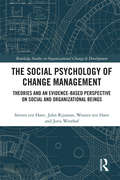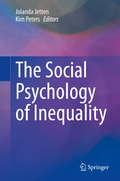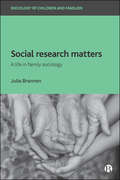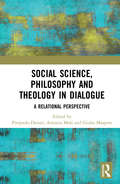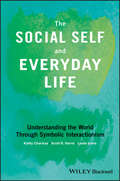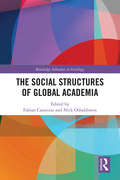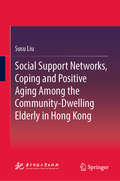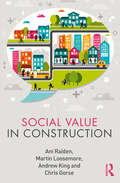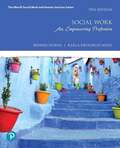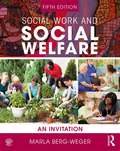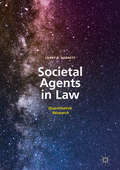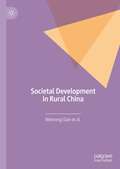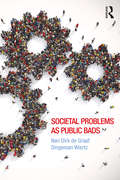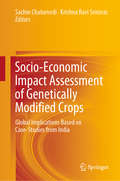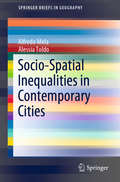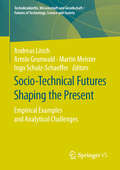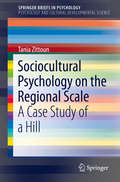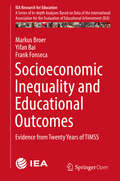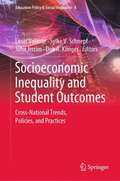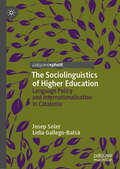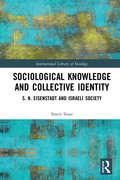- Table View
- List View
The Social Psychology of Change Management: Theories and an Evidence-Based Perspective on Social and Organizational Beings (Routledge Studies in Organizational Change & Development)
by Steven ten Have John Rijsman Wouter ten Have Joris WesthofChanges are rarely accomplished by individuals. People are social animals and changes are social processes which have to be organized. Social psychology is essential for the effectiveness and development of the field of change management. It is necessary to understand people in change processes. Social psychology also teaches us that meaning is key during change and intervention. Social psychology makes change management comprehensible to people and allows them to consider their actions in groups and the organization on their merits. They may seem obvious and self-evident, but practice and science, as well as the popular change management literature, show that it is not.Drawing on the field of social psychology and based on primary research, The Social Psychology of Change Management presents more than forty social psychological theories and concepts that are relevant for the field of change management. The theories and concepts are analyzed and categorized following Fiske’s five core social motives; belonging, understanding, controlling, enhancing self, and trusting. Each theory will have an introduction in which its assumptions and relevance is explained.By studying the scientific evidence, including meta-analytic evidence, the book provides practitioners, students and academics in the field of change management, organizational behaviour and business strategy the most relevant social psychological ideas and best available evidence, thereby further unleashing the potential of social psychology in order to feed the field of change management. By categorizing and integrating the relevant theories and concepts, change management is enriched and restructured in a prudent, positive and practical way. The overarching goal, however, inspired by the ideas and perspective of leading thinkers like Kurt Lewin, James Q. Wilson and Susan T. Fiske, is to make the world a better place. Social psychologists (being social scientists) study practical social issues, in our case issues related to change management, and application to real-world problems is a key goal. Therefore, this book goes beyond the domain of organizational sciences.
The Social Psychology of Inequality
by Jolanda Jetten Kim PetersEconomic inequality has been of considerable interest to academics, citizens, and politicians worldwide for the past decade–and while economic inequality has attracted a considerable amount of research attention, it is only more recently that researchers have considered that economic inequality may have broader societal implications. However, while there is an increasingly clear picture of the varied ways in which economic inequality harms the fabric of society, there is a relatively poor understanding of the social psychological processes that are at work in unequal societies. This edited book aims to build on this emerging area of research by bringing together researchers who are at the forefront of this development and who can therefore provide timely insight to academics and practitioners who are grappling with the impact of economic inequality. This book will address questions relating to perceptions of inequality, mechanisms underlying effects of inequality, various consequences of inequality and the factors that contribute to the maintenance of inequality. The target audiences are students at advanced undergraduate or graduate level, as well as scholars and professionals in the field. The book fills a niche of both applied and practical relevance, strongly emphasizing theory and integration of different perspectives in social psychology. Given the broad interest in inequality within the social sciences, the book will be accessible to sociologists and political scientists as well as social, organizational, and developmental psychologists. The insights brought together in The Social Psychology of Inequality will contribute to a broader understanding of the far-reaching costs of inequality for the social health of a society and its citizens."This edited volume brings together cutting-edge social psychological research addressing one of the most pressing issues of our times – economic inequality. Collectively, the chapters illuminate why inequality has negative effects on individuals and societies, when and for whom these negative effects are most likely to emerge, and the psychological mechanisms that maintain inequality. This comprehensive volume is an essential read for those interested in understanding and ameliorating inequality." -Brenda Major, Distinguished Professor, Department of Psychological and Brain Sciences, University of California “This invaluable volume demonstrates the indispensable and powerful contribution that social psychologists can make to our understanding of societal inequality. For those outside of social psychology it provides a unique and comprehensive overview of what social psychology has to offer, and for social psychologists it is exemplary in demonstrating how to make a systematic contribution to the understanding of a hotly debated real-world issue. Scholars and students alike and from various disciplines will gain much from reading this fascinating and inspiring social psychological journey.”-Maykel Verkuyten, Professor in Interdisciplinary Social Science, University of Utrecht“The Social Psychology of Inequality offers a superb and timely social-psychological analysis of the causes and consequence of increasing wealth and income gaps. With its refreshingly international authorship, this volume offers profound insights into the cognitive and social mechanisms that help maintain, but potentially also to overcome, an economy that is rigged in favor of the wealthy. A new and stimulating voice, illustrating science in the service of a fairer and more democratic society.” -Anne Maass, Professor of Social Psychology, University of Padova“This volume assembles an impressive list of leading international scholars to address a timely and important issue, the causes and consequences of economic inequality. The approach to the topic is social psychol
Social Research Matters: A Life in Family Sociology (Sociology of Children and Families)
by Julia BrannenFrom the vantage point of forty years in social research and the study of families, Julia Brannen offers an invaluable account of how research is conducted and ‘matters’ at particular times. This fascinating work covers key developments in the field that remain of vital concern to society and demonstrates how social research is an art as well as a science – a process that involves craft and creativity.
Social Science, Philosophy and Theology in Dialogue: A Relational Perspective
by Pierpaolo Donati Antonio Malo Giulio MasperoThis volume explores the potential of employing a relational paradigm for the purposes of interdisciplinary exchange. Bringing together scholars from the social sciences, philosophy and theology, it seeks to bridge the gap between subject areas by focusing on real phenomena.Although these phenomena are studied by different disciplines, the editors demonstrate that it is also possible to study them from a common relational perspective that connects the different languages, theories and perspectives which characterize each discipline, by going beyond their differences to the core of reality itself. As an experimental collection that highlights the potential that exists for cross-disciplinary work, this volume will appeal to scholars across a range of field concerned with critical realist approaches to research, collaborative work across subjects and the manner in which disciplines can offer one another new insights.
The Social Self and Everyday Life: Understanding the World Through Symbolic Interactionism
by Kathy Charmaz Scott R. Harris Leslie IrvineAn engaging text that enables readers to understand the world through symbolic interactionism This lively and accessible book offers an introduction to sociological social psychology through the lens of symbolic interactionism. It provides students with an accessible understanding of this perspective to illuminate their worlds and deepen their knowledge of other people’s lives, as well as their own. Written by noted experts in the field, the book explores the core concepts of social psychology and examines a collection of captivating empirical studies. The book also highlights everyday life—putting the focus on the issues and concerns that are most relevant to the readers’ social context. The Social Self and Everyday Life bridges classical theories and contemporary ideas, joins abstract concepts with concrete examples, and integrates theory with empirical evidence. It covers a range of topics including the body, emotions, health and illness, the family, technology, and inequality. Best of all, it gets students involved in applying concepts in their daily lives. Demonstrates how to use students’ social worlds, experiences, and concerns to illustrate key interactionist concepts in a way that they can emulate Develops key concepts such as meaning, self, and identity throughout the text to further students’ understanding and ability to use them Introduces students to symbolic interactionism, a major theoretical and research tradition within sociology Helps to involve students in familiar experiences and issues and shows how a symbolic interactionist perspective illuminates them Combines the best features of authoritative summaries, clear definitions of key terms, with enticing empirical excerpts and attention to popular ideas Clear and inviting in its presentation, The Social Self and Everyday Life: Understanding the World Through Symbolic Interactionism is an excellent book for undergraduate students in sociology, social psychology, and social interaction.
The Social Structures of Global Academia (Routledge Advances in Sociology)
by Nick Osbaldiston Fabian CannizzoHigher education and research are now at the centre of economic and social policy in advanced information societies. Global networks of researchers, finance, students and policymakers invoke collaborative sociological perspectives. What it means to be an academic and to work in a technologically advanced knowledge industry has undergone transformations that cross national borders. The future of knowledge production, social development, prosperity and the freedom of ideas are caught in the swelling of global tides. The Social Structures of Global Academia exposes readers to a variety of issues that are impacting academics across the globe. The volume includes contributions by leading social scientists and innovative research from emerging scholars. Its anchoring themes include academic ethics, the affective cultures of scholarship, changing funding structures and social control of the currents of scholarly life. Giving readers an overview of the growing field of critical studies of academia, The Social Structures of Global Academia will appeal to students and scholars seeking to understand more of the burgeoning field of critical sociologies of higher education, and general readers interested in contemporary knowledge about universities, science and the people who make it their passion. It will also appeal to policymakers who are invested in trying to make universities more viable places to work.
Social Support Networks, Coping and Positive Aging Among the Community-Dwelling Elderly in Hong Kong
by Susu LiuThe dramatically increasing aging population of Hong Kong has elicited new risks and opportunities to facilitate a positive life for older adults. This book offers a holistic review of gerontological theories and literature, and constructs a conceptual framework of social support networks, coping and positive aging. In light of the implications of the convoy model of social support to depict an indigenous landscape of positive aging in Hong Kong, this is one of the very few empirical studies that adopts both quantitative research and qualitative research. The research consisted of a pilot study of in-depth interviews with 16 older Hong Kong Chinese and a main study surveying 393 older members of District Elderly Community Center. The results of the study indicate that family and peer support constitute the mainstay of support networks of the elderly, and that family and peer support are associated with positive aging. Moreover, the study shows that it is the depth of emotional closeness, namely, close interaction and intimacy with social partners that makes the greatest contribution to positive aging. Additionally, problem coping and emotion coping are found to mediate the relationship between social support networks and positive aging. There is potential in bringing more domestic helpers into elderly care and improving the service quality such that the goal of Aging in Place can be promoted in Hong Kong. Intended for researchers in social work, gerontology and positive psychology, it is also essential reading for graduates and social work professionals interested in this area. This book makes a valuable contribution to social gerontological research among Hong Kong older adults and the promotion of wellbeing in the elderly via the construct of positive aging in the culture of Chinese society.
Social Value in Construction
by Ani Raiden Martin Loosemore Andrew King Chris GorseWhile the concept of social value is not new, recent interest in social value in construction has grown because of new social procurement legislation around the world and an increasing acceptance of the need to ensure construction projects provide social value, rather than simply economic value. Despite this growing recognition, literature and professional guidance on the subject is hard to find. This is the first book looking at social value in construction and it sets the agenda by asking and answering important questions like: How is the construction industry developing and supporting social enterprise and social value and for who? How and when is the industry recording and measuring social value and its effect? Which organisations are doing things well and what can we learn from their experiences? What can industry players do together to consolidate efforts and drive improvements? What are the key challenges in the field and what does the future look like? Drawing on a variety of professional and academic experiences and disciplines, the authors present global perspectives and lay the foundations for creating social value in the construction industry. This timely book makes use of real-life case studies and examples of best practice to demonstrate how innovative companies can utilise contemporary research to create social value through their projects. It is time the construction industry viewed community involvement and corporate social responsibility as an opportunity rather than a risk, and this is the book that shows the industry how. This is essential reading for all professionals in the construction, engineering, architecture and built environment sector. In particular, project managers, clients, contract managers, quantity surveyors, CSR and HR personnel will gain a lot from reading this book.
Social Work: An Empowering Profession
by Brenda Dubois Karla MileyWith its strengths and empowerment approach, Social Work: An Empowering Profession, 7 explores contemporary themes such as diversity and social justice and integrates the Council on Social Work Education's core competencies throughout. Each chapter reflects and integrates the core competencies in the 2008 Educational Policy and Accreditation Standards (EPAS) set by the Council on Social Work Education (CSWE). End-of-chapter assessment reinforces this integration, and MySocialWorkLab.com activities support the mastery of CSWE's core competencies.
Social Work and Social Welfare: An Invitation
by Marla Berg-WegerSocial Work and Social Welfare: An Invitation is a best-selling text and website for introduction to social work courses. It provides students with the knowledge, skills, and values that are essential for working with individuals, families, groups, organizations, communities, and public policy in a variety of practice settings. The fifth edition of Social Work and Social Welfare is in full color, with more visuals and photos throughout. As with previous editions, this book is an up-to-date profile of the world in which today’s social workers practice, with current demographic, statistical, legislative, policy, and research information; and sensitive discussions of contemporary ethical issues. The text includes exercises from six interactive cases.Visit www.routledgesw.com for the detailed cases and companion materials that teach students about social work through practice. In this book and companion custom website you will find: ■■ An emphasis on a strengths-based perspective and attention to diversity, social environment, theory and theoretical frameworks, levels of social work practice, and an array of fields of practice. ■■ The histories of social welfare and the social work profession presented as the intertwined phenomena that they are. ■■ A profile of the contemporary landscape of the society in which social workers practice. ■■ Social work practice within the framework of planned change, encompassing: engagement, assessment, intervention, and evaluation and termination. ■■ The opportunity to hear from social work practitioners working in fourteen diverse and challenging practice settings. ■■ Six unique, in-depth, interactive, easy-to-access cases that students can easily reach from any computer, provide a “learning by doing” format unavailable with any other text(s). Students will have an advantage unlike any other they will experience in their social work training. ■■ A wealth of instructor-only resources provide: full-text readings that link to the concepts presented in each of the chapters; a complete bank of objective and essay-type test items, all linked to current CSWE EPAS standards; PowerPoint presentations to help students master key concepts; annotated links to a treasure trove of social work assets on the internet; and a forum inviting all instructors using texts in the series to communicate with each other, and share ideas to improve teaching and learning.
Social Work and Sustainability in Asia: Facing the Challenges of Global Environmental Changes (Routledge Advances in Asia-Pacific Studies)
by Alice Chong Iris ChiThe rapid trend of globalization has brought with it a variety of sustainability challenges, including global climate change, biodiversity loss, poverty, and social inequalities, which are problems with unclear boundaries, complicated interrelated components, undefined parameters, contradictory values, and no single solution. Social work has a long-standing tradition of emphasizing the interaction of people and their environment. For this reason, the field of social work is one of the best-placed academic disciplines for studying the impact of environmental change on social systems, and should play an important role in developing strategies for mitigating and adapting to these environmental challenges. However, traditional social work tends to lack sustaining work and neglect globally interconnected social problems. Combining case studies and country reports from around Asia with a theoretical framework for understanding sustainability concerns, this book aims to show how social work can play a valuable role in mitigating and adapting to environmental challenges and social sustainability. For social work to develop a meaningful and viable profession that addresses contemporary sustainability issues, it requires changes and transformation in paradigm, theories, strategies, social policy and social services that will facilitate a sustainable future for all mankind.
Societal Agents in Law: Quantitative Research
by Larry D. BarnettIn this two-volume set, Larry D. Barnett delves into the macrosociological sources of law concerned with society-important social activities in a structurally complex, democratically governed nation. Barnett explores why, when, and where particular proscriptions and prescriptions of law on key social activities arise, persist, and change. The first volume, Societal Agents in Law: A Macrosociological Approach, puts relevant doctrines of law into a macrosociological framework, uses the findings of quantitative research to formulate theorems that identify the impact of several society-level agents on doctrines of law, and takes the reader through a number of case analyses. The second volume, Societal Agents in Law: Quantitative Research, reports original multivariate statistical studies of sociological determinants of law on specific types of key social activities. Taken together, the two volumes offer an alternative to the almost-total monopoly of theory and descriptive scholarship in the macrosociology of law, comparative law, and history of law, and underscore the value of a mixed empirical/theoretical approach.
Societal Development in Rural China
by Wenrong QianThis book provides a broad survey of Chinese rural households, examining ongoing changes in Chinese society and economy through the lens of the situation of rural families in China. Based on data from Zhejiang University’s China Rural Household Panel Survey (CRHPS) in 2015 on rural households, which analyses all aspects of grass-roots rural households in China, this volume offers a scientific analysis of social development in rural China, exploring notably the basic structure, employment situation, income and expenditure, social security, and education situation of Chinese rural households, as well as the governance and public services of rural communities.
Societal Problems as Public Bads
by Nan Dirk de Graaf Dingeman WiertzCorruption, crime, economic inequality, religious fundamentalism, financial crises, environmental degradation, population ageing, gender inequality, large-scale migration… This book tackles many of the most pressing problems facing societies today. The authors demonstrate that similar social mechanisms lie behind many of these seemingly disparate problems. Indeed, many societal problems can be traced back to behaviours that are perfectly rational and often well-intended from an individual perspective. Yet, taken together these behaviours can – paradoxically – give rise to unintended and undesirable outcomes at the society level. In addition to addressing the causes of societal problems, the book explains why some problems rank higher on the public agenda than others. Moreover, it is shown how government intervention may sometimes provide a cure, yet other times exacerbate existing problems or create new problems of its own. This book includes an extensive amount of data on trends and geographic variation in the prevalence of different problems, as well as telling examples – both recent and historical – from a variety of countries to support its key arguments. Employing a bold multidisciplinary approach, the authors draw on insights from across the social sciences, including sociology, economics, anthropology, criminology, and psychology. Throughout the book, students are introduced to analytical concepts such as free-riding, herding behaviour, principal-agent relations and moral hazard. These concepts are essential tools for better understanding the roots of many societal problems that regularly make headlines in the news. This improved understanding will, in turn, be critical for ultimately finding solutions to these problems.
Society: The Basics
by David Myers Jean TwengeConnecting Social Psychology to the world around us. Social Psychology introduces students to the science of us: our thoughts, feelings, and behaviors in a changing world. Students learn to think critically about everyday behaviors and gain an appreciation for the world around us, regardless of background or major. In this edition, esteemed author David Myers is again joined by respected psychology professor and generational differences researcher Jean Twenge, in presenting an integrated learning program designed for today's students.
Society the Basics
by John J. MacionisSociety: The Basics, Fifteenth Edition, provides you with comprehensive understanding of how this world works. You will find this title informative, engaging, and even entertaining. Before you have finished the first chapter, you will dis-cover that sociology is both enlightening and useful, and it is also a great deal of fun. Sociology is a field of study that can change the way you see the world and open the door to many new opportunities. What could be more exciting than that?
Socio-Economic Impact Assessment of Genetically Modified Crops: Global Implications Based on Case-Studies from India
by Sachin Chaturvedi Krishna Ravi SrinivasThis book provides a comprehensive overview of socio-economic impact assessments for genetically modified organisms, including genetically modified crops. It features case studies involving Bt cotton and other selected crops with improved traits from six major institutions in India and combines field data with surveys on stakeholder perceptions. It also discusses global trends in the socio-economic assessment of GMOs and reviews the available literature on the economic assessment of GM crops and how various countries have implemented Article 26.1 of the Cartagena Protocol on Biosafety. Further, it explores cost–benefit analyses and sociological aspects of socio-economic assessments.Based on this, the book proposes a framework and offers guidelines for socio-economic assessment that can be adapted for various GM crops. Lastly, it examines the relevance of socio-economic impact assessment in light of new applications such as GM mosquitoes and gene drives. Given its scope, the book is of interest to all academics, policymakers, regulators, and general readers concerned about the broader impacts of GM crops and applications like gene drives.
Socio-Spatial Inequalities in Contemporary Cities (SpringerBriefs in Geography)
by Alfredo Mela Alessia ToldoThe book explores social inclusion/exclusion from a socio-spatial perspective, highlighting the active role that space assumes in shaping social phenomena. Unlike similar books, it does not discuss exclusion and inclusion in particular geographical contexts, but instead explains these phenomena starting from the dense and complex set of relationships that links society and space. It particularly focuses on social differences and how the processes of exclusion and inclusion can produce a highly spatialized understanding of them, for example when particular groups of people are perceived as being out of place.At the same time, within the context of the different approaches that policies adopt to contrast the phenomena of social exclusion, it examines the role of participation as an instrument to promote bottom-up inclusion and cohesion processes.
Socio-Technical Futures Shaping the Present: Empirical Examples and Analytical Challenges (Technikzukünfte, Wissenschaft und Gesellschaft / Futures of Technology, Science and Society)
by Andreas Lösch Armin Grunwald Martin Meister Ingo Schulz-SchaefferThe exploration of ways to conceptualize the shaping of the present by socio‐technical futures is the aim of this volume. Therefore it brings together contributions from Science and Technology Studies and Technology Assessment, which focus all on the question how socio-technical images of the future shape present processes of innovation and transformation starting from empirical case studies and generalizing specific findings or by tackling conceptual questions from the outset. A white paper of 23 authors, which aims to sensitize researchers and practitioners completes the volume.
Sociocultural Psychology on the Regional Scale: A Case Study of a Hill (SpringerBriefs in Psychology)
by Tania ZittounThis brief presents the case study of a hill in Czech Republic (Říp) and its region, and contributes to theorization in sociocultural psychology on three points, along three current debates. First, it contributes to the exploration of the mutual constitution of the lifecourse and of history, uses a distinction between socio-, micro- and ontogenesis, and argues that a focus on a delimited geographical space enables to better observe the processes by which history, daily situated interactions and courses of life shape each other. Second, in doing so, it sketches an understanding of the role of the material, spatial and semiotic specificities of landscapes in human development. Especially, it identifies some of the processes by which redundant dynamic patterns present in the environment may participate to the guidance of human experience. Third, it expands the reflection on case study construction and generalization. On the one side, it participates to a current debate in cultural psychology on the dynamics of generalization from single cases; on the other, it also dialogues with a more general reflection in the social sciences on social dynamics at the scale of small regions. Altogether, this brief is a first attempt to examine jointly these questions at the scale of a small region, a unique natural laboratory of social and psychological change. It will be of interest to researchers as well as graduate students in the fields of cultural and sociocultural psychology, cognitive psychology, and the social sciences.
Socioeconomic Inequality and Educational Outcomes: Evidence from Twenty Years of TIMSS (IEA Research for Education #5)
by Markus Broer Yifan Bai Frank FonsecaThis open access book focuses on trends in educational inequality using twenty years of grade 8 student data collected from 13 education systems by the IEA’s Trends in Mathematics and Science Study (TIMSS) between 1995 and 2015. While the overall positive association between family socioeconomic status (SES) and student achievement is well documented in the literature, the magnitude of this relationship is contingent on social contexts and is expected to vary by education system. Research on how such associations differ across societies and how the strength of these relationships has changed over time is limited. This study, therefore, addresses an important research and policy question by examining changes in the inequality of educational outcomes due to SES over this 20-year period, and also examines the extent to which the performance of students from disadvantaged backgrounds has improved over time in each education system. Education systems generally aim to narrow the achievement gap between low- and high-SES students and to improve the performance of disadvantaged students. However, the lack of quantifiable and comprehensible measures makes it difficult to assess and monitor the effect of such efforts. In this study, a novel measure of SES that is consistent across all TIMSS cycles allows students to be categorized into different socioeconomic groups. This measure of SES may also contribute to future research using TIMSS trend data. Readers will gain new insight into how educational inequality has changed in the education systems studied and how such change may relate to the more complex picture of macroeconomic changes in those societies.
Socioeconomic Inequality and Student Outcomes: Cross-National Trends, Policies, and Practices (Education Policy & Social Inequality #4)
by Louis Volante Sylke V. Schnepf John Jerrim Don A. KlingerThis book examines socioeconomic inequality and student outcomes across various Western industrialized nations and the varying success they have had in addressing achievement gaps in lower socioeconomic status student populations. It presents the national profiles of countries with notable achievement gaps within the respective school-aged student populations, explains the trajectory of achievement results in relation to both national and international large-scale assessment measures, and discusses how relevant education policies have evolved within their national contexts. Most importantly, the national profiles investigate the effectiveness of policy responses that have been adopted to close the achievement gap in lower socioeconomic status student populations. This book provides a cross-national analysis of policy approaches designed to address socioeconomic inequality.
The Sociolinguistics of Higher Education: Language Policy and Internationalisation in Catalonia
by Josep Soler Lídia Gallego-BalsàThis book investigates the sociolinguistic dimension of the internationalisation of higher education, examining the linguistic tensions and ambiguities experienced by universities around the world, particularly in non-anglophone contexts. Joining current debates within discursive and ethnographic approaches to language policy, the authors analyse the narrative emerging from university language policy documents, and then trace the stance-taking processes of different stakeholders at a small university in Catalonia. They pay particular attention to how teachers, administrative staff, and exchange students position themselves in connection to the role of Catalan and its coexistence with other languages at the university. This book will be of interest to language policy scholars and practitioners, as well as graduate students in sociolinguistics and applied linguistics
The Sociolinguistics of Iran’s Languages at Home and Abroad: The Case of Persian, Azerbaijani, and Kurdish
by Seyed Hadi MirvahediThis book examines the sociolinguistics of some of Iran’s languages at home and in the diaspora. The first part of the book examines the politics of minority languages and the presence of hegemonic discourses which favour Persian (Farsi) in Iran, exploring issues such as language maintenance and shift, linguistic ideologies and practices among Azerbaijani and Kurdish-speaking communities. The authors then go on to examine Iranians’ linguistic ideologies, practices and (trans)national identity construction in the diaspora, investigating both the challenges of maintaining a home language and the strategies and linguistic repertoires employed when constructing a diasporic identity away from home. This book will be of interest to students and scholars of minority languages and communities, diaspora and migration studies, and language policy and planning.
Sociological Knowledge and Collective Identity: S. N. Eisenstadt and Israeli Society (International Library of Sociology)
by Stavit SinaiSociology, emerging in the 19th century as the study of national societies, is the intellectual product of its time, power relations and social imaginaries. As a discursive practice that was enmeshed in the meta-narratives of modernity, the discipline of sociology bears the inherent capacity to shape socially shared concepts and construct collective identities. This book examines the relationships between sociology and projects of national identity construction, and presents a critique of Shmuel N. Eisenstadt, the prominent Israeli sociologist known as the "father of Israeli sociology". The book focuses on Eisenstadt’s sociology of Israel as a case of knowledge construction within an ideological system and examines the relationships between his various sociological analyses of Israeli society and the Zionist imaginary, namely the deeply entrenched political myths and historiographical narratives that constitute Israel’s hegemonic national identity. By emphasizing the interrelation between textuality, identity, and loaded language, the volume seeks to demythologize Eisenstadt’s sociology of Israel. Three major concepts in Eisenstadt’s scholarship are specifically thematized: integration, civilization, and modernities. In each of these foci, the author shows how Eisenstadt’s sociological conjectures reproduce dominant Zionist historiographical representations of the past, rationalize prevalent social hierarchies, reify the boundaries of a national collective "Self", and render legitimacy to Israel’s governing ethnocratic tendencies, underlying the premises of the Zionist settler-colonial project. Sociological Knowledge and Collective Identity will appeal to those interested in the interconnectedness of sociology and political memory, as well as in a radical postcolonial reconstruction of sociology.
